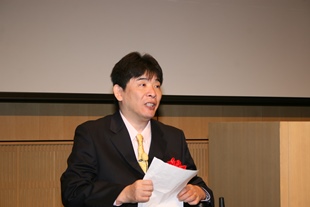 The 13th Asia Pacific Research Prize (Iue Prize) “Commendation” winner:
The 13th Asia Pacific Research Prize (Iue Prize) “Commendation” winner:
Dr. Toshiyuki Uwano
Title of Dissertation :
“The Accessibility for People with Disabilities in the Civil Society of Vietnam: A Comparison with the Case of Public Transportation in Beijing, Bangkok, and Taipei”

- Dr. Toshiyuki Uwano
-
- Career -
Graduated from the Department of Chinese Studies, Faculty of Foreign Studies, Tokyo University of Foreign Studies in 2006. Completed Master course of the Graduate School of Area and Culture Studies, Tokyo University of Foreign Studies, and obtained a master’s degree in Global Studies in 2008. Started the latter doctoral course of the Department of Area Studies, Graduate School of Arts and Sciences, the University of Tokyo in 2010, and obtained a Ph.D. in March 2014.
- Summary -
The welfare culture of Asia should not be discussed in the context of Western countries with advanced welfare systems because it is dependent on mutual aid among local residents. This paper compares accessibility for people with disabilities in urban areas in Asia based on field research carried out by using a wheelchair in certain areas in Asia with the aim of classifying the types of welfare culture peculiar to Asia.Accessibility in urban areas has been promoted along with economic growth, and barrier-free accessible environments provided in developed countries are generally more functional and higher-quality than those in developing countries. Although the developing countries aiming for urgent ratification of Convention on the Rights of Persons with Disabilities are making efforts to promote accessibility, the accessibility provided in such countries tends to be less functional and less efficient. Giving consideration to the fact that the percentage of people with disabilities in Vietnam is higher than in other countries and the estimated costs involved for the creation of an accessible environment, more effective measures to promote accessibility in Vietnam are required.
In order to address issues concerning accessibility in Vietnam, three cities that are considered to provide useful insights into the case of Vietnam have been selected from 19 cities in Asia through fieldwork: Beijing, a city of a government-led socialist state; Bangkok, a city located in Southeast Asia where the disability rights movement has been actively promoted; Taipei, a city aiming to solve the problem of traffic congestion caused by its motorcycle-centric society. This paper analyzes how societies with accessibility for people with disabilities in these three cities have been established, in order to explore the possibility of utilizing the knowledge, methods and technologies for the promotion of accessibility in Vietnam.
The social participation of people with disabilities requires the understanding of the general public. Also, from the viewpoint of regional culture, accessibility needs to be established through systems suitable to regional features, not by simply adopting established systems of developed countries. A questionnaire survey conducted in the two major cities of Vietnam, Hanoi and Ho Chi Minh, to research public awareness suggests that Vietnamese people tend to have a high level of awareness of mutual aid. Based on this result, this paper proposes promoting the social participation of people with disabilities in line with Vietnamese culture in such a manner that the cooperation and understanding of the general public will compensate for the economic disadvantage. Finally, this paper explores possible means to change the social status of people with disabilities, from “people subject to protection” to “ordinary rightful citizens,” by regarding accessibility not only as elimination of physical obstacles but also as a tool to promote the social participation of people with disabilities, and creating a social environment where people with disabilities can be both producers and consumers.






